
Nebraska Death Row for men is located at the Tecumseh State Correctional Institution. The Nebraska Death Row for women is located at the Lincoln Correctional Center. Nebraska primary method of execution is lethal injection
Death Row, Serial Killers, Teen Killers. Women On Death Row Executions

Nebraska Death Row for men is located at the Tecumseh State Correctional Institution. The Nebraska Death Row for women is located at the Lincoln Correctional Center. Nebraska primary method of execution is lethal injection
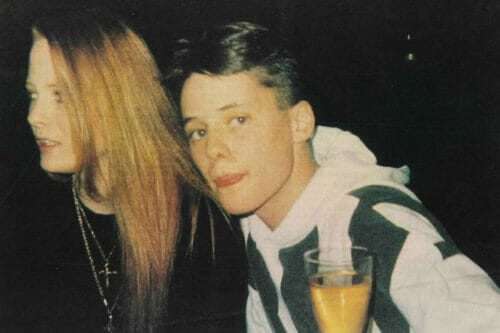
The Brandon Teena murder shocked the Nation when it occurred and it opened the door to discussions regarding violence towards trans-gendered individuals. In this article on My Crime Library we will take a closer look at the Brandon Teena story the basis of the movie Boys Don’t Cry
Brandon Teena was born on December 12, 1972 in Lincoln Nebraska. From an early age Brandon, whose birth name was Teena Renae Brandon, Would bounce back and forth with her older sister between their grandparents and their mother until Brandon was three years old
As young children the two children would be sexually abused by their Uncle for several years. Brandon who was identifying as a male from a young age would be described as awkward by her classmates. When the two children were sent to a Catholic school Brandon would begin to rebel and would dress in a more masculine fashion.

In 1993 after following legal trouble in which Brandon Teena was arrested for passing forged checks he would move into the home of Lisa Lambert and soon would start dating a friend of Lambert’s Lana Tisdel. Brandon would also start hanging out with John Lotter and Marvin Thomas “Tom” Nissen. When Brandon was arrested and would be bailed out by Tisdel his secret of being born a female was revealed.
Soon after getting out of jail Brandon Teena would be forced by Lotter and Nissen to prove that she was indeed a female and would force Lana Tisdel to watch. Brandon Teena would be forced into a vehicle where he was driven to a remote location where she would be gang raped by Lotter and Nissen. Lana Tisdel would convince Brandon Teena to go to an emergency room and where the doctor would be more interested in her sexuality than the actual rape. The rape kit would be lost.
John Lotter and Tom Nissen would learn that Brandon Teena reported the sexual assault and began the search for him. On December 31, 1993. Lotter and Nissen would break into Lisa Lambert’s home where they would find Brandon Teena. Brandon Teena, Lisa Lambert and Phillip Devine (who was dating Tisdel’s sister) would all be fatally shot.

Tom Nissen and John Lotter would soon be arrested for the triple murder and very quickly Tom Nissen would make a deal with prosecutors in order to escape the death penalty. John Lotter would be convicted and sentenced to death.
Over the years there has been much debate on whether or not Tom Nissen was the actual killer and that prosecutors sent the wrong man to death row in Nebraska.
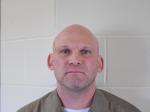
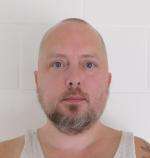
Twenty years ago in a little Nebraskan town called Falls City, a handsome 21-year-old transman with big blue eyes was brutally beaten, raped and murdered in one of the most heinous hate crimes in American history.
His name was Brandon Teena.
Though his murder immediately made headlines, it was Kimberly Peirce’s film dramatization Boys Don’t Cry in 1999 that made Brandon’s story familiar to millions of Americans—and won Hilary Swank an Oscar for her moving portrayal of him.
Brandon left his hometown of Lincoln, Nebraska, for Falls City at the age of 20, hoping to start a new life in a community where no one knew him. He started dating Lana Tisdel, and found a family of sorts in her inner circle of friends, including John Lotter and Marvin “Tom” Nissen. But upon discovering Brandon was a biological female, Lotter and Nissen became obsessed with proving his anatomy to Lana, forcibly disrobing him in a bathroom on Christmas Eve, and hours later, raping him. On New Years Eve, to prevent him from ever pressing charges, they killed him and two bystanders.
Today, Lotter remains on death row at Tecumseh State Correctional Institution, having been convicted of the killings with Nissen’s testimony. Nissen is serving three life sentences at the Lincoln Correctional Center. In 2007, he recanted his original testimony and now admits he murdered the three victims with Lotter as his accomplice.
But another figure in this horrifying story remains free.
On December 25, mere hours after being sexually assaulted, Brandon faced a demeaning and dehumanizing line of questioning from the Richardson County Sheriff, Charles Laux, when reporting his attackers. In a recent interview from her L.A. office, director Peirce called it “a third rape.”
C: [A]fter he pulled your pants down and seen you was a girl, what did he do? Did he fondle you any?
B: No.
C: He didn’t fondle you any, huh. Didn’t that kind of amaze you?…Doesn’t that kind of, ah, get your attention somehow that he would’ve put his hands in your pants and play with you a little bit?
…
C: [Y]ou were all half-ass drunk….I can’t believe that if he pulled your pants down and you are a female that he didn’t stick his hand in you or his finger in you.
B: Well, he didn’t.
C: I can’t believe he didn’t.
…
C:…Did he have a hard on when he got back there or what?
B: I don’t know. I didn’t look.
C: You didn’t look. Did he take a little time working it up, or what? Did you work it up for him?
B: No, I didn’t.
C: You didn’t work it up for him?
B: No.
C: Then you think he had it worked up on his own, or what?
B: I guess so, I don’t know.
C: You don’t know…Did, when he got in the back seat you were already spread out back there ready for him, waiting on him.
B: No, I was sitting up when he got back there.
….
C: And you had never had sex before?
B: No.
C: How old are you?
B: 21.
C: And if you’re 21, you think you’d have, you’d have, trouble getting it in?
….
C: Why do you run around with girls instead of, ah, guys being you are a girl yourself?
B: Why do I what?
C: Why do you run around with girls instead of guys being you’re a girl yourself?
B: I haven’t the slightest idea.
C: You haven’t the slightest idea? You go around kissing other girls?….[T]he girls that don’t know about you, thinks [sic] you are a guy. Do you kiss them?
….
B: …I have a sexual identity crisis.
C: A what?
B: I have a sexual identity crisis.
C: You want to explain that?
B: I don’t know if I can even talk about it….
I recently re-watched Susan Muska and Greta Olafsdottir’s Emmy-nominated 1998 documentary The Brandon Teena Story, which unearthed this excruciating exchange. The duo spent more than five years researching and reporting the case, even moving into an apartment in Falls City to attend all the trials and sentencings. Without their excellent investigative journalism we would have never learned of the extreme misconduct and inhumanity Brandon suffered from Laux. Hearing his cruelty anew, it finally occurred to me why he seems the cruelest in this cast of characters: There’s something particularly perverse about a man entrusted with the duty to protect choosing instead to hurt and humiliate.
Peirce, who also spent more than half a decade researching and making her film, chose to underscore the disturbing and participatory nature of Laux’s questions about the crime by playing out the rape scene in flashback with Swank’s voiceover, as she gets grilled by Laux. When I recently spoke with Peirce, she noted “a level of provocation and pleasure [that Laux derived] out of making Brandon relive his own torture.”
Despite ample evidence, Laux neglected to apprehend and charge Lotter and Nissen, giving them the opportunity to plan and execute Brandon’s murder twenty years ago today on December 31, 1993. JoAnn Brandon, Brandon’s mother, was eventually awarded $5000 for wrongful death, $7000 for intentional infliction of emotional distress, $80,000 for “mental suffering” and $6,223.20 for funeral expenses.
I wondered if the stain of Laux’s legacy still lingered in Falls City’s Sheriff’s Office, or if they’d made procedural efforts to improve their dealings with LGBT populations. After all, transgender rights and visibility have increased significantly since 1993.
To find out how much progress has made its way to the Richardson County Sheriff’s Office, I reached out to the current sheriff, Randy Houser, an affable 61-year-old from Omaha. I first asked Houser if he could get me in touch with Laux, wondering whether he has any regret about the way he handled things.
“I’m pretty sure he will not speak with you,” Houser wrote in an email. He encouraged me, however, to give it a try. When my letter requesting an interview went unanswered, I called Laux’s home in Dawson. “You know, you people are a pain in the ass!” he yelled, upon hearing why I was calling, and hung up.
“That’s ‘our Charlie’!” Houser said. “He has rationalized his role to the point where he’s blameless. I’m sure it’s a defense mechanism.” Houser updated me on Laux’s life since 1993. Just a few years after the tragedy, he was voted commissioner of Richardson County. When his term ended, he took a job as a corrections officer at the Nebraska State Penitentiary, where Lotter sits on death row. As recently as 2010, he even served on his community’s Village Board. Now retired, he drives a school bus.
That Laux could have garnered enough votes to hold any office—and cart children to school—surprised me. “Well,” Houser laughed, “these aren’t exactly offices of high reward!”
He joked that Falls City “is a few miles from the ends of the earth,” but assured me that he and his compatriots “are a lot more evolved than you might expect.” Many law enforcement officials at the time thought Laux’s behavior was “appalling,” he said. “A series of bad decisions were made by the guy at the top and that won’t be me if something like this happens again. Things are not the same.”
Today, police vehicles are equipped with in-car videos and officers are outfitted with wireless microphones so they are monitored and held accountable for their actions. Also, basic law-enforcement training is an intense 16 weeks at the Nebraska Law Enforcement Training Center in Grand Island, where the curriculum includes a viewing and discussion of the The Brandon Teena Story and staged sexual-assault and domestic-violence scenarios between straight and gay couples
Not to justify his wrongdoing, but to partially explain Laux’s ignorance, Houser told me that Laux’s training was far inferior to what officers receive today: “Charlie was in his third 4-year term as sheriff in 1993. He was a cop for years prior to that. His basic training experience was probably in the late 70’s or early 80’s, when it lasted all of six weeks.”
Today, Brandon Teena’s experience would be different, Houser said. Richardson County now has access to services from Project Response, a support advocacy group based out of Omaha and Lincoln that assists with domestic violence and sexual assault cases. “If there was strong evidence of witness intimidation or reprisal as there was in this case,” Houser explained, “we would link up with Project Response and that person would be put in a safe house, given a cell phone that can only dial 911 and their personal phone would be taken away from them so their perpetrators can’t track them down.”
“A rape,” he continued, “especially one involving kidnapping, physical assault and death threats was as rare then as it is today. The majority of our caseload is protection order violations, DUIs, driving under suspension and domestic violence. [A case like Brandon’s] would be an emergency, a drop-everything situation—and it would probably be handed over to state patrol investigators, who have more resources.”
Houser lives with his wife of 33 years, Julie, eight blocks from the courthouse. In modern-day Falls City—population 4,300—conservatism comes in the form of “mind your own business, live your own life,” he told me. While he’s sure there are some gays in town, “they’re not overt about it. There’s not saying, ‘I’m gay!’”
I couldn’t quite tell if he meant it approvingly—as if gays should avoid public displays of affection—or if he was just reporting. But that he could use some LGBT-awareness training is clear: He referred to Brandon as “she,” called being transgender a “lifestyle,” and suggested discrimination towards gay people was non-existent in Falls City.
I asked, hypothetically, if he’d be willing to do a LGBT-sensitivity training session with PFLAG, a queer advocacy group founded in 1972 that has done significant law enforcement outreach in the past, as a way to acknowledge the mishandling of Brandon’s case and firmly close that chapter on Falls City’s history.
“Oh absolutely!” he responded. “That goes without saying.”
PFLAG was happy to help out when I explained the idea. Liz Owen, the communications director of PFLAG National in Washington D.C., arranged for Ellen James of the Omaha chapter to train Houser and his staff.
“We have a training session scheduled on Jan 18th,” Houser wrote to me two weeks later. “I also invited our local police department and neighboring Sheriff to attend.”
James, a lawyer with a transgender daughter, will be covering a lot of ground, according to Owen: “Basic education about the LGBT community—defining and explaining the differences in biology, gender identity, gender expression, and sexual orientation. She will also cover the terminology in the transgender community; facts about homeless youth and research on family acceptance; and best practices for officers in interacting with members of the transgender community.”
“I was discussing the upcoming presentation with one of my deputies,” Houser wrote to me in one of our last email exchanges, “and he asked: ‘What is the definition of a transgender person?’ I struggled to define it, but I basically came to the conclusion that a transgender person is whatever they say they are.”
It’s a simple concept—honoring however people want to define themselves—but it requires a leap of imagination Lotter, Nissen and Laux couldn’t make—and it would have made all the difference.
federal judge on Friday shot down a killer’s challenge to Nebraska’s method for determining death sentences, likening the attempt to a desperation play in football.
A three-judge panel sent John Lotter to death row in 1996 for his role in a 1993 triple murder near Humboldt that inspired the fictional film “Boys Don’t Cry.”
In Nebraska’s system, juries decide a defendant’s guilt in capital cases, followed by a separate trial in which the same jury decides whether aggravating favors exist to warrant a death sentence.
A three-judge panel then convenes to weigh any mitigating factors in the defendant’s favor.
The judges also must determine if the death sentence is warranted and, if so, whether it is proportionate to the penalty imposed in similar cases.
Lotter’s attorneys argued that Nebraska’s system is similar to one in Florida that was found to be unconstitutional last year by the U.S. Supreme Court. They sought to pursue a new argument that their client has a right to have jurors, not judges, weigh his fate.
But U.S. District Judge Richard Kopf described Lotter’s challenge as “meritless and, perhaps, even frivolous” in an order he released Friday.
“While a ‘Hail Mary’ may work in football, it does not work here,” Kopf wrote
The judge also determined that the U.S. Supreme Court, in a related case, has said decisions on death penalty sentencing schemes do not apply retroactively to defendants whose sentences had previously been upheld on appeal. Such has been the case with Lotter, whose death sentence has been affirmed repeatedly in both federal and state courts.
In essence, Kopf said the high court’s ruling in the Florida case does not apply to Lotter.
Lotter has a similar death penalty challenge pending in Richardson County District Court based upon the Florida decision.
Marvin Thomas Nissen and Lotter were convicted in the 1993 killings of Teena Brandon, a transgender person who went by the name Brandon. They sought to silence Brandon after he reported to authorities that he was raped by the men, who were upset upon learning his biological gender. They also killed two others at a rental house where Brandon was staying: Lisa Lambert, 24, and Phillip DeVine, 22.
Nissen was sentenced to life in prison after he provided testimony for the state at Lotter’s trial. Nissen has subsequently said he fired the handgun that killed all three victims but lied on the witness stand when he told jurors that Lotter was the gunman.
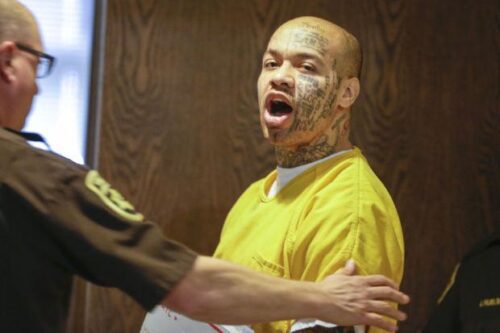
Nikko Jenkins is currently on death row in Nebraska for the murders of four people. Nikko Jenkins who was just released from prison a month prior would murder the four victims in a series of robberies. In this article on My Crime Library we will take a closer look at Nikko Jenkins who is classified as a spree killer however an argument could be made to call him a serial killer.
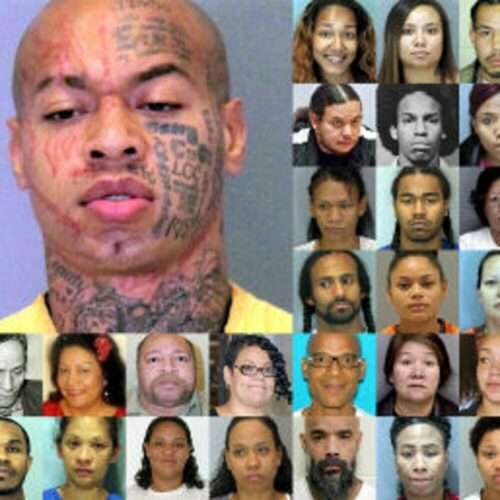
Nikko Jenkins was literally raised in a family of criminals. He would only be seven years old the first time that he ran into trouble with the law when he brought a loaded gun to school. This would not be the last time
Nikko Jenkins would be in and out of group homes and juvenile facilities until he was fifteen years old when he would be arrested for an armed carjacking that would send him to prison for the next decade.
Nikko Jenkins would be released from prison and soon would be back to his criminal ways. With the help of his sister and cousin Jenkins would set up the first two victims with the help of his sister and cousin.
Juan Uribe-Pena and Jorge C. Cajiga-Ruiz were lured to a hotel with the promise of sex not knowing they were walking into an ambush. His sister and cousin would later claim that they thought it would be a straight up robbery however Nikko Jenkins would fatally shoot both men.
A little over a week later Nikko Jenkins would murder Curtis Bradford a man that he had met in prison and was on friendly terms with. The two would hang out the night before the murder. Reportedly Nikko Jenkins sister would tell him that Bradford was responsible for shooting up their home. Nikko Jenkins would fatally shoot Curtis Bradford
The last victim was Andrea Krueger who was dragged from her vehicle and shot multiple times.
Nikko Jenkins would be arrested nine days later on a count of uttering terrorist threats and soon after Nebraska police would realize that Nikko was responsible for the spree of murders that took place in the prior weeks
Realizing that the evidence against him was overwhelming Nikko Jenkins would confess to the four murders. Jenkins who would plead guilty to all four murders however his sanity would come into question
Nikko Jenkins would be tested by a number of doctors who in the end would declare him competent to stand trial. Jenkins would be found guilty of all four murders but before he could be sentenced his competency would again be called into question. Again Nikko would be declared competent and a few of the doctors believed he was faking.
Jenkins who was called one of the most dangerous men in Nebraska history would be sentenced to death in May 2017 for the four murders and would receive an additional 450 years.
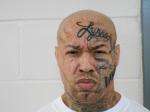
On Sept. 3, 2013, Nikko Jenkins confessed to an Omaha murder spree that took the lives of four people during a police interrogation. In the interrogation, Jenkins says the murders were acts of sacrifice to Apophis.
“Do you not realize I’ve got Nikko Jenkins?” the detective asks in the video above. “I got Nikko Jenkins. I got you! I’ve got your DNA at the murder scene. I’ve got your DNA in the car. I’ve got the weapon. I’ve got Nikko Jenkins.”
Jenkins was 30 when he was convicted of killing three men and a young mother — Juan Uribe-Pena, Jorge C. Cajiga-Ruiz, Curtis Bradford and Andrea Kruger — over a 10 day period. Jenkins began his murder spree less than two weeks after his release from prison. Bradford was the only victim Jenkins knew, having met him in prison. All others were randomly targeted.
Jenkins admitted to investigators that he shot Juan Uribe-Pena and Jorge C. Cajiga-Ruiz, each in the head, and took one of their wallets. Investigators believe the two were lured there under the guise of having sexual relations with women.
Jenkins also admitted to Bradford’s murder, saying he had to use a shotgun to finish him off since a revolver didn’t kill him.
Jenkins said he encountered Kruger, who authorities believe was heading home from work, at a west Omaha bar.
Detectives testified that Jenkins watched Kruger leave McDonald’s and stopped in front of her at the intersection where she was later found dead. Jenkins admitted to investigators, that Kruger pleaded with him to let her go, but he ultimately shot her in the head three times and once in the chest.
Testimony in court Tuesday revealed that Jenkins drove her car to 40th Street, where he “gave it to a crackhead to burn.”
A three judge panel sentenced Nikko Jenkins to death four times for four murders nearly four years after a summer killing rampage. Additionally, he received up to 500 years in prison for his remaining counts.
“This is one of the worst killing sprees in the history of this state,” Judge Peter Battalion said.
Jenkins told investigators Egyptian demons were possessing him and that the only way he could get rid of terrible headaches brought on by the demons was to kill people.
Despite courtroom outbursts that included speaking in tongues and laughter, Jenkins insisted he was not crazy.
“This is what I want the public to know. I never ever deemed myself to be incompetent or lacking in intellectual capacities. I am a high-functioning, mentally ill patient. There are 4 percent high functioning, severely suffering from psychosis in this country,” Jenkins said.
The Supreme Court is passing for now on deciding whether juries must find all facts necessary to impose a death sentence or whether judges can play a role, an issue Nebraska and Missouri death row inmates had asked the court to take up.
The high court on Monday declined to hear appeals brought by Nikko Jenkins in Nebraska and Craig Wood in Missouri. The court, as is usual, didn’t comment in turning away the cases.
Jenkins is on death row in Nebraska after killing four people in Omaha shortly after his 2013 release from prison, where he had served 10 years for two carjackings. Jenkins pleaded no contest to the killings, and a three-judge panel was appointed to sentence him. Jenkins waived his right to have a jury assess aggravating circumstances, and the panel sentenced him to death.
Wood is on death row in Missouri after being convicted of kidnapping, raping and killing 10-year-old Hailey Owens in 2014. The jury that convicted Wood couldn’t decide whether to sentence him to death or life in prison without parole. That left the decision up to the judge who oversaw Wood’s trial.